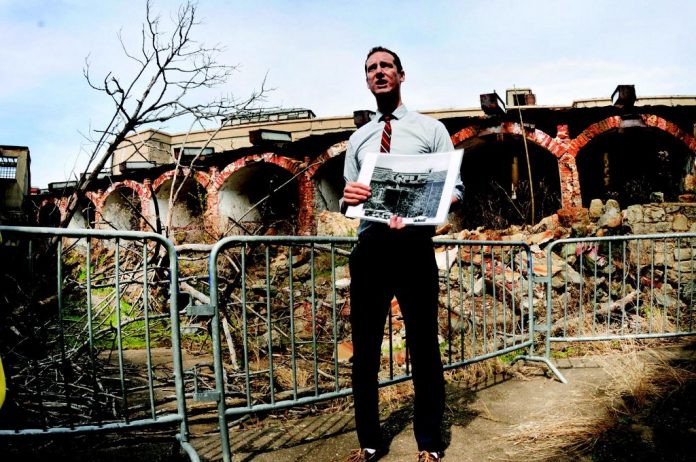Francis Dolan discusses “The Ruins of Death Row.” MARIA POUCHNIKOVA / TIMES PHOTO
— New Eastern State programs will take visitors to death row, as well as the old operating room.
There are two basic types of spectacles to be seen at Eastern State Penitentiary.
There are the ghostly brick and mortar remains of what two centuries ago was the most expensive and famous prison in the world. And there are the uniquely disturbing mental images conjured by visitors while standing amid the ruins of the old “wagon wheel.”
The former always seem to beget the latter and surely will continue to do so during the National Historic Site’s 2012 tour season as two of the old prison’s darkest, most disturbing places will be incorporated into interactive exhibits for the first time.
The Operating Room and The Ruins of Death Row both debut this year, along with a third program examining family relationships at Eastern State. A new art installation will also debut. The Battle Between Carnival and Lent by Judith Schaechter features 17 original stained glass murals examining the conflict between good and evil within those once housed at the prison.
Eastern State occupies an 11-acre site at 20th Street and Fairmount Avenue. It’s open daily from 10 a.m. to 5 p.m. with many scheduled guided tours.
The non-profit museum’s administrators responded to public demand perhaps more than any other motivation in formulating the 2012 programming.
“This is something visitors have asked to see for years and years. It’s an eerie and fascinating place,” said Sean Kelley, director of public programming.
Kelley was speaking specifically of the then state-of-the-art medical facility that opened at the prison in the 1870s.
Death Row garners similar curiosity.
TAPPING INTO CURIOSITY
“In general, there’s a morbid fascination with something called ‘Death Row,’” said Fran Dolan, associate director for tour programs. “It’s the same thing with Eastern State in general. People want to see another side of society. … To actually have a chance to come into the space and think about it is very powerful.”
According to Kelly Otterson, the tour program manager, physicians performed many surgical procedures in the prison “hospital” instead of taking inmates into less-secure environs. They did tumor removal, hernia surgery, appendectomies and emergency surgery on trauma injuries, such as stab wounds incurred during a cellblock fight.
“Al Capone had his tonsils removed in this room,” Otterson said.
Doctors experimented with cosmetic surgery, too, working on the widely believed theory that certain facial features influenced a person’s likelihood of criminal behavior.
The medical center was in Cell Block 3, one of the seven that made up the original wagon-wheel layout.
When Eastern State first opened in 1830, Cell Blocks 1 and 2 filled quickly, while 3 was still under construction. So the administration housed the older and sick inmates in 3, even before locks had been installed on the cells.
It remained as the prison’s sickbay until converted into a full-fledged medical office. The operating room opened in 1910 in a converted exercise yard. Not much is left of it today. Crews had to clear tons of debris that had fallen to the floor from the crumbling walls and ceiling.
The overhead lamp is a defining feature.
A fund-raising campaign is underway to fund an archeological study and to stabilize the deteriorating architecture.
DANGEROUS CELLS
Death Row, also known as Cell Block 15, was completed in 1959 as the last of many retrofitted blocks added to accommodate the growing inmate population.
With 36 cells on two tiers, the block also housed inmates considered too dangerous to live in general population, even if they had not been sentenced to death.
Visitors are permitted in an adjoining, dedicated and quite cramped “exercise” yard. The triangular space is tucked between blocks 2 and 11. Tree-sized weeds and collapsed walls make it an urban ruin while allowing for better visual inspection of the design and layout.
“We’re going to leave it like it is. We really like the ruin of Eastern State and visitors like the ruin of Eastern State,” Dolan said.
Reminders of the people who once inhabited Death Row are evident. There’s a dedicated guard tower over the yard. Inside each cell, inmates had a single plumbing fixture that served as both sink and toilet.
“That’s particularly horrendous,” Dolan noted.
Executions were performed elsewhere in the state. Otherwise, inmates rarely if ever got out of Death Row. In one case, the administration sent a dentist onto Death Row to pull an inmate’s infected tooth, rather than to risk transporting the inmate.
Fearing for the dentist’s safety, the administration had him stand outside the cell as the inmate pressed his mouth against the bars for the extraction. Meanwhile, armed prison officers stood guard.
ART IMITATES LIFE
Not that any compassionate visitor would have difficulty imagining the horrors of prison life, but Schaechter’s stained glass art places those sorrows and contrasting enlightenment into a compelling metaphorical context. The windows are new and will be removed following the 2012 tour season. Yet, they capture the prison’s haunting natural light as if they’ve been there since Day One.
“This is my dream location for where my work should be seen,” said the artist, who is known for the somber, introspective subject matter of her work. “Even though it’s a prison, a place of horribleness, each cell is reminiscent of a sacred space.”
Constructed of sections of painted and ground glass, the compositions reflect matter-of-factly on the human struggles faced by all people, including those doomed to incarceration. They contrast temptation with spiritual enlightenment.
“Everyone has felt the problem of impulse control in their lives,” Schaechter said. ••
For a full listing of Eastern State Penitentiary attractions and events, visit www.EasternState.org or call 215–236–5111.





